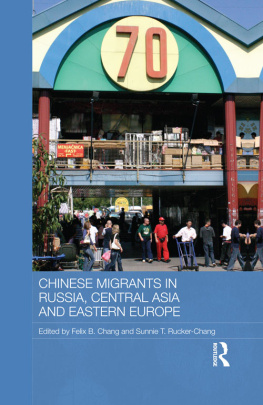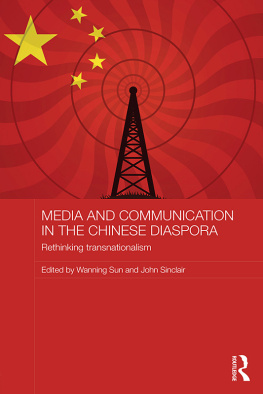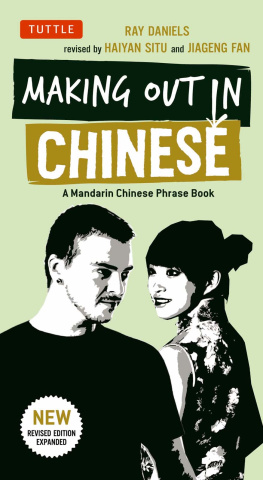
Affective Encounters
Against the background of Chinas rapidly growing, and sometimes highly controversial, activities in Africa, this book is among the first of its kind to systematically document Sino-African interactions at the everyday level.
Based on sixteen months of ethnographic fieldwork at two contrasting sites in Lusaka, Zambiaa Chinese state-sponsored educational farm and a private Chinese family farmDi Wu focuses on daily interactions among Chinese migrants and their Zambian hosts. Daily communicative events, e.g. banquets, market negotiations, work-place disputes, and various social encounters across a range of settings are used to trace the essential role that emotion/affect plays in forming and reproducing social relations and group identities among Chinese migrants. Wu suggests that affective encounters in everyday situationsas well as failed attempts to generate affectshould not be overlooked in order to fully appreciate Sino-African interactions.
Deeply researched and with rich ethnographic detail, this book will be relevant to scholars of anthropology, international development, and others interested in Sino-African relations.
Di Wu is a Departmental Lecturer in the School of Anthropology and Museum Ethnography at the University of Oxford, UK. He gained his PhD at the London School of Economics, UK and previously worked at SOAS, UK and Sun Yat-sen University, China.
London School of Economics Monographs on Social Anthropology
Managing Editor: Laura Bear
The Monographs on Social Anthropology were established in 1940 and aim to publish results of modern anthropological research of primary interest to specialists. The continuation of the series was made possible by a grant in aid from the Wenner-Gren Foundation for Anthropological Research, and more recently by a further grant from the Governors of the London School of Economics and Political Science. Income from sales is returned to a revolving fund to assist further publications. The Monographs are under the direction of an Editorial Board associated with the Department of Anthropology of the London School of Economics and Political Science.
Affective Encounters
Everyday Life among Chinese Migrants in Zambia
Di Wu
First published 2021
by Routledge
2 Park Square, Milton Park, Abingdon, Oxon OX14 4RN
and by Routledge
52 Vanderbilt Avenue, New York, NY 10017
Routledge is an imprint of the Taylor & Francis Group, an informa business
2021 Di Wu
The right of Di Wu to be identified as author of this work has been asserted by him in accordance with sections 77 and 78 of the Copyright, Designs and Patents Act 1988.
For legal purposes the Acknowledgements on pp. viii-ix constitute an extension of this copyright page.
All rights reserved. No part of this book may be reprinted or reproduced or utilised in any form or by any electronic, mechanical, or other means, now known or hereafter invented, including photocopying and recording, or in any information storage or retrieval system, without permission in writing from the publishers.
Trademark notice : Product or corporate names may be trademarks or registered trademarks, and are used only for identification and explanation without intent to infringe.
British Library Cataloguing-in-Publication Data
A catalogue record for this book is available from the British Library
Library of Congress Cataloging-in-Publication Data
A catalog record has been requested for this book
ISBN: 978-1-350-10243-9 (hbk)
ISBN: 978-1-003-08439-6 (ebk)
Typeset in Minion Pro
by Deanta Global Publishing Services, Chennai, India
For my parents and for J. A. L
Contents
This book would not have been possible without generous help from many people. First and foremost, my greatest debt is to my hosts in Lusaka, Zambia. It was their hospitality that helped me overcome my loneliness during fieldwork and made me feel at home even though I was thousands of miles away from it. My special thanks go to the staff at the China-Zambia Agricultural Technology Demonstration Centre. They provided me with a base to carry out my research, introduced me to the local community and offered me many insights into the daily routines of a Chinese state project in Zambia. I am also truly grateful to the Zou family. Father and Mother Zou received me like their own son and looked after me just as my parents would have done. They shared many fascinating personal stories with me. Their own son, Xiao Zou, often drove me around Lusaka to visit farms, companies and interviewees. It was their generosity, their tender care and their unconditional support that partly oriented my research interest towards questions of emotion and affect. I also warmly thank Mr Mbozi, farm manager of the University of Zambia Farm, and the many Zambian friends I got to know at the China-Zambia Agricultural Technology Demonstration Centre. Through sharing shima (a local staple) with them, our afternoon chit-chats and visits to a local church I started to understand their concerns and began to see the China-Zambia relationship from a very different perspective.
This book is based on research partly funded by the Newby Trust. For this support I am very grateful. Several draft chapters were presented at the writing-up seminar at the LSE Department of Anthropology. I have benefited enormously from the comments and suggestions made there, and I appreciate the help of all the members of this seminar. I also feel deeply grateful to the Department of Anthropology at Sun Yat-Sen University, where a post-doctoral position granted me more time and resources to further polish this manuscript for publication.
I am indebted to those who read and commented on parts of this book at various stages: Eona Bell, Hsiao-Chiao (Evie) Chiu, Ana Paola Gutierrez, Andrea Pia, Hans Steinmuller, Tan Tongxue, Johanna Whiteley, Matthew Williams, Mag Wong and Qiu Yu. I also need to thank the series editor, Professor Laura Bear, for her kindest help while I was revising the manuscript for publication.
I also want to thank my supervisors, Professor Charles Stafford and Professor Stephan Feuchtwang, for their endless help since I began the doctoral programme at LSE. I appreciate their prompt and insightful feedback on my drafts. I have learnt a great deal from them. They have shown me not only what a serious scholar ought to be but also how caring a supervisor can be. Specifically, I want to thank Charles for his perceptive advice and steady encouragement that kept me going through some tough phases across the years, and also for his kind help with my book manuscript. Equally, I benefited enormously from my discussions with Stephan, who has been exceptionally inspiring and understanding. I am deeply indebted to them for their guidance and support.
Last but not least, I would like to thank my parents for their unfailing support and love.
On my British Airways flight from London to Lusaka, my mood was unsettled as questions flew through my mind. What was fieldwork going to be like in Zambia? How would I be treated? Lonely, uneasy and worried, being the only Chinese person on the aircraft did not help me either. The moment I stepped out of the plane, the bright sunshine half-blinded me. I could vaguely make out the symbol for the Bank of China not far from me on a big advertisement board near the terminal exit. As I approached, the picture became clearer: Chinese people dressed in red and navy blue uniforms and smiling broadly. Bank of China welcomes you ( zhongguoyinhanghuanyingnin ), proclaimed a line of Chinese characters above the image. I was immediately aware of very complex feelings. As an anthropology student trained in Britain, I automatically connected the scene unfolding in front of me to questions of economic imperialism and domination questions that have, of course, been routinely raised in relation to Chinas recent Africa initiatives; meanwhile, being Chinese, the familiar images, symbols and their placement around me as I passed through the airport offered me some vague reassurance and slightly eased my tension. Following the herd of white travelers just off the British Airways flight, I very quickly passed immigration control without being questioned or checked. (Only months later, after I had several times helped my Chinese interlocutors to meet their friends from China at the airport, I realized that not all flights or passengers could enjoy such a smooth transit.) Walking past the luggage check, I spotted a young Chinese guy at the other end of the barrier holding a sign with my name.








